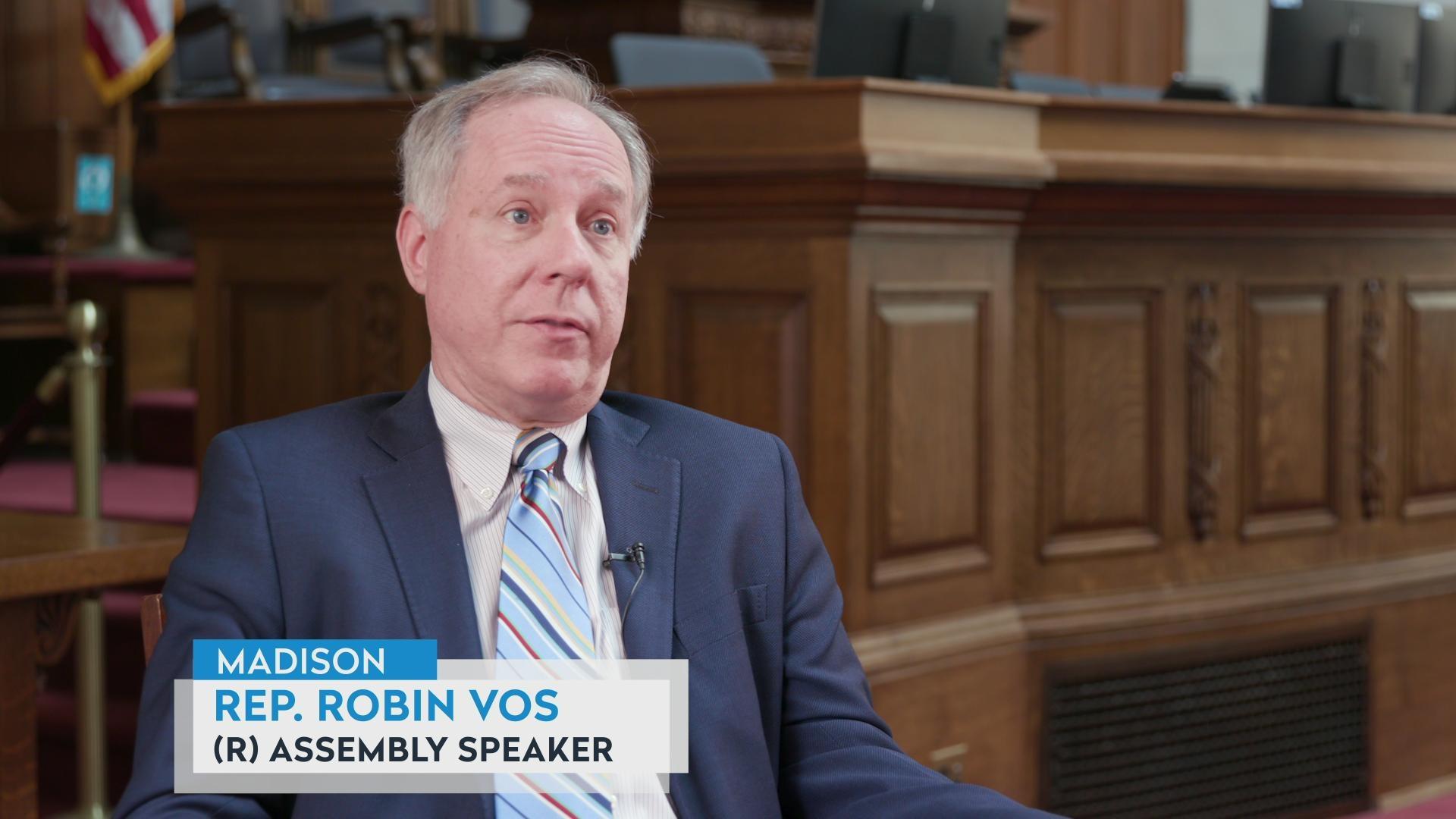Frederica Freyberg:
A raft of Republican antiabortion bills are headed to votes on the floor of the Assembly. Bills include a proposed law that would end Medicaid funding for Planned Parenthood, ban abortions based on the sex, race or physical defect of the fetus, and require medical staff to tell women that drug-induced abortions could be reversed and require care for babies born alive during an abortion procedure. Representative Barbara Dittrich is the co-author of the bill that would cut Medicaid funding for Planned Parenthood. She also cosponsored the proposal on abortions related to sex and race. I sat down with the Oconomowoc Republican at the capitol. We started by asking her about a bill prohibiting so-called born alive abortions, reminding her how President Trump described born alive abortion. The baby is born wrapped and then the doctor and mother decide whether they will execute the baby. Is that how you perceive what happens in late term abortions?
Barbara Dittrich:
Actually, yes, I do. He was quoting, the president was quoting the Governor of Virginia describing that on a radio interview. So that’s where that verbiage comes from. I think most of the public is generally against late term abortion. And really this bill is not so much about actively taking the child’s life, but failing to render aid. And people would see the end result as pretty much the same thing. Very disturbing.
Frederica Freyberg:
I do have to just point out that Politifact Wisconsin said this about what the president said. They said Trump grossly oversimplified one of the hardest choices parents face. We rate this claim false. So I mean Politifact decided that what he said was false. Recent statistics in Wisconsin show fewer than 1% of abortions occur after 20 weeks and according to physicians, they involve problems incompatible with life. Why is this bill needed, in your mind?
Barbara Dittrich:
Well, I would say that that’s a falsehood. That it’s needed because a child’s condition is incompatible with life. I have a son with a severe genetic disorder. People would take his life. Most cases where the baby has some difficulties, you would do a caesarean section, not an abortion and kill the child. I think if parents had more information and knew, like we heard in testimony this week, the hope there is and the joy there is in every life, that they would be less inclined to take that life. There’s a lot of pressure on these parents to do things like that. And I think we need to show compassion by preserving that life.
Frederica Freyberg:
Governor Evers vows to veto this bill, as you know, saying doctors are not killing babies and current law covers homicide. If a veto is a foregone conclusion, what’s the point?
Barbara Dittrich:
Well, just as Governor Evers was elected, so was our Assembly and Senate. And our constituents expect us to stand for life. I have heard overwhelmingly from constituents two to one that are in favor of really taking a stand on this. And especially since the laws that we’re seeing moving across this nation involving like Virginia and New York, that’s disturbing to people. Even though Governor Evers doesn’t think this is important, we had a nurse testify at the health care committee just over the state line in Illinois that things like this are happening. And we want to be proactive rather than reactive in a situation like this.
Frederica Freyberg:
You sponsored one of the bills that would prohibit abortions based solely on the race, sex or disability of the fetus. How frequent is that practiced?
Barbara Dittrich:
Well, sadly, we don’t keep statistics in this state. And I find that tremendously disturbing. But, again, there is tremendous pressure, I hear, having worked 16 years in the special needs community, from parents who had prenatal diagnoses where they were pressured by the medical community to end their child’s life in utero. If we wouldn’t discriminate against a human being after they’re born, we surely can’t do it before they’re born. It’s just not right.
Frederica Freyberg:
One of the questions I had was how would the state know if that was a mother’s reason for an abortion?
Barbara Dittrich:
That is a great question. And I actually was hoping it would come up in testimony. It did not. However, we know now people have genetic ultrasounds done. People have genetic testing done. Amniocentesis. You can test cord blood, all these sort of things. There is a medical trail on these sort of things. And, again, the pressure from the medical community can really make this quite apparent.
Frederica Freyberg:
Another of your bills would disallow Medicaid funds to private health care providers who perform abortions. Is that aimed at Planned Parenthood in Wisconsin?
Barbara Dittrich:
Not just at Planned Parenthood. I think that taxpayers feel, okay, you have your right to an abortion, but we don’t want to have to pay for it.
Frederica Freyberg:
I spoke with Representative Dittrich earlier. Mel Barnes is the legal and policy director of Planned Parenthood of Wisconsin. She joins us now. Thanks very much for being here.
Mel Barnes:
Thank you for having me.
Frederica Freyberg:
So as to the born alive bill, Representative Dittrich just told us that she agreed with how President Trump described why it’s needed by saying a doctor and mother decide whether they will execute the baby when it is born alive following a late term abortion. What is your response to that description?
Mel Barnes:
I would say the president’s statements are simply not true and they’re deeply offensive. These bills are being introduced by people for one reason and it is to spread misinformation intentionally about abortion care, women’s health and the doctors who provide that care.
Frederica Freyberg:
How often is it that babies are born alive after an abortion?
Mel Barnes:
This is not happening. Let me be clear. Infanticide is illegal in the state of Wisconsin. We already ban abortion after 20 weeks in pregnancy. This is simply not happening in our state.
Frederica Freyberg:
Who are candidates for such late term abortions?
Mel Barnes:
Women who seek abortion later in pregnancy are often faced with tragic circumstances. Unfortunately, we know that not every pregnancy turns out the way that a family would have hoped. Women who are facing complex medical complications may seek abortion later in pregnancy. But again that care is banned in our state. Women in tragic circumstances often have to travel outside of Wisconsin to get the health care that they need.
Frederica Freyberg:
Governor Evers says that he will veto this bill. Why do you think the majority has it and other antiabortion measures on the fast track like this?
Mel Barnes:
The people who are introducing these bills have one goal and it is to make abortion criminal in every circumstance. These bills are politically motivated. And if the authors of these bills wanted to promote women’s health and children’s health in our state, they would be supporting the governor’s budget which has a comprehensive proposal for addressing women’s health and reducing infant mortality in our state.
Frederica Freyberg:
Other bills include prohibiting abortion based solely on race, sex or disability of the fetus. In your experience, what is the number one reason for someone who aborts a fetus?
Mel Barnes:
Women have abortions for all sorts of personal reasons but we know that this is not what’s happening in our state. These bills are about restricting access to abortion and not being asked for by groups who have historically faced discrimination. The only groups asking for these bills are people who want to ban all abortion and even access to birth control and sex education in Wisconsin.
Frederica Freyberg:
As for the bill that would effectively cut off Medicaid payments to Planned Parenthood, what is your response to that?
Mel Barnes:
Again, this is not about abortion. The services impacted by this bill are lifesaving, critical preventative care like birth control, annual exams and cancer screenings. The people proposing these bills say that they’re about harming Planned Parenthood and taking funds away from Planned Parenthood, but we know that who’s hurt by these bills are patients who rely on Planned Parenthood to access care that they need.
Frederica Freyberg:
And yet it should be noted clearly that Planned Parenthood does perform abortions in Wisconsin.
Mel Barnes
That’s true. We also bill Medicaid just like every other medical provider and that’s for services rendered for a patient sitting in front of us. We are not billing for abortion care in Wisconsin. We’re using Medicaid funds to see patients for critical, preventive care like annual exams and cancer screenings, not abortion care.
Frederica Freyberg:
Representative Dittrich says that that bill is not aimed just at Planned Parenthood but other private providers who perform abortions across Wisconsin. So what would that do for women who might seek that kind of care?
Mel Barnes:
What I can say is that in communities where Planned Parenthood is a provider, we’re often the only place that women have to turn for these services and often one of the only providers that’s willing to accept Medicaid patients without a waiting list. We never turn anyone away because of their inability to pay. And that’s critical for people getting the health care that they need.
Frederica Freyberg:
But again you’re saying that Medicaid itself, those funds, do not pay for abortions?
Mel Barnes:
That’s correct. We’re talking about birth control, cancer screenings, STD testing and treatment.
Frederica Freyberg:
All right. We leave it there. Mel Barnes, thanks very much.
Mel Barnes:
Thank you.
Search Episodes
News Stories from PBS Wisconsin

Donate to sign up. Activate and sign in to Passport. It's that easy to help PBS Wisconsin serve your community through media that educates, inspires, and entertains.
Make your membership gift today
Only for new users: Activate Passport using your code or email address
Already a member?
Look up my account
Need some help? Go to FAQ or visit PBS Passport Help
Need help accessing PBS Wisconsin anywhere?

Online Access | Platform & Device Access | Cable or Satellite Access | Over-The-Air Access
Visit Access Guide
Need help accessing PBS Wisconsin anywhere?

Visit Our
Live TV Access Guide
Online AccessPlatform & Device Access
Cable or Satellite Access
Over-The-Air Access
Visit Access Guide
 Passport
Passport


















Follow Us